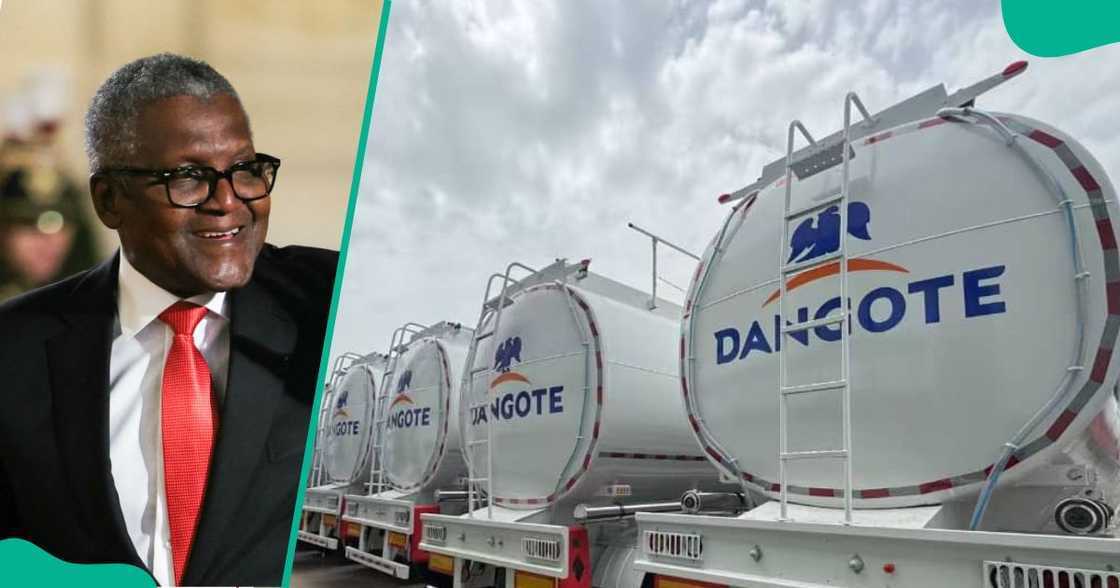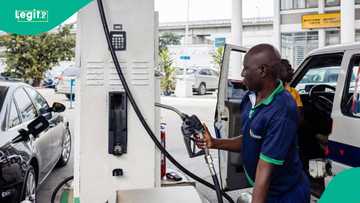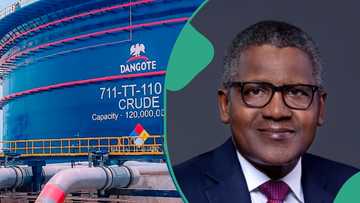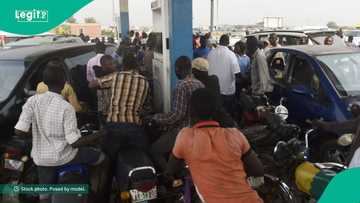End of Overloading: Dangote Refinery Begins Strict 45,000-Litre Limit for Fuel Trucks
- The $20 billion Dangote Refinery is setting a strict law for truck drivers by placing a new loading limit
- The refinery disclosed in a recent statement that truck drivers under its employment are mandated to adhere to the 45,000L loading limit
- The loading limit was announced the Nigerian government to curb cases of tanker accidents and explosions
Pascal Oparada, a reporter for Legit.ng, has over ten years of experience covering technology, energy, stocks, investment, and the economy.
The Dangote Petroleum Refinery has announced that it will begin enforcing a strict 45,000-litre truck loading limit for all petroleum products, Premium Motor Spirit (PMS), Automotive Gas Oil (AGO), and Aviation Turbine Kerosene (ATK), effective November 1, 2025.
The move, the refinery said, is in compliance with a directive from the Nigerian Midstream and Downstream Petroleum Regulatory Authority (NMDPRA), which recently reaffirmed its policy restricting truck capacity to curb overloading and its associated risks.

Source: Twitter
A new chapter of regulatory enforcement
In a circular to customers signed by the Group Commercial Operations of Dangote Petroleum Refinery and Petrochemicals FZE, the refinery stated:
“In line with the directive from the NMDPRA, please be informed that the maximum truck loading capacity for PMS, AGO and ATK is now set at 45,000 litres. Kindly ensure all trucks are calibrated accordingly and have a valid chart reflecting the same. This directive takes effect from November 1, 2025.”
This marks a defining shift for the Nigerian downstream sector, which for decades has grappled with widespread overloading practices that led to road damage, product diversion and frequent tanker explosions.
Dangote Refinery said it will only admit trucks physically calibrated and certified for 45,000 litres, signalling a zero-tolerance policy toward non-compliance.
All non-conforming trucks will be denied access to loading points, the refinery warned.
Analysts say this move could redefine logistics planning for marketers, independent depot operators and transporters who have historically relied on extra-capacity trucks to maximise margins.

Read also
Nigeria, Togo, Benin, other West African countries to have same fuel prices as Dangote plans upgrade
Why the NMDPRA enforced the 45,000L cap
The NMDPRA’s directive is not new, but it’s now being strictly implemented with digital oversight. For years, trucks loaded between 50,000 and 70,000 litres, often exceeding axle limits and posing safety and environmental risks.
The consequences have been grave:
- Recurring tanker explosions resulting in fatalities and loss of property.
- Rapid road deterioration due to axle weight overload.
- Product diversion and smuggling, especially in border regions.
- Inconsistent depot practices, enabling corruption and revenue loss.
With the introduction of real-time truck instrumentation and digital loading records, the regulator now has tools to track compliance — and the Dangote Refinery’s enforcement could set a new industry benchmark.
Industry braces for adjustment
As the November 1 deadline nears, major and independent marketers are recalibrating fleets and updating documentation to avoid operational disruptions during the busy year-end demand period.
While initial slowdowns in loading are expected, experts believe the change will bring long-term gains in accountability, safety and route efficiency.

Source: Getty Images
The Dangote Refinery reaffirmed its commitment to full regulatory alignment and “globally benchmarked operations,” describing the move as a step toward a more structured and transparent downstream ecosystem.
A safer, fairer future for Nigeria’s fuel distribution
For a country long plagued by unsafe roads and fuel diversion scandals, this development could mark the beginning of a disciplined and data-driven era in petroleum logistics, one where every litre is accounted for and every journey safer.
A precious report by Legit.ng disclosed that the massive refinery deployed about 3,100 CNG trucks as it begins nationwide fuel supply.
The scheme, which the refinery said will reduce fuel cost, has failed to achieve its objective as petrol prices have climbed since October.
Marketers call out Dangote over non-supply of paid fuel
Legit.ng earlier reported that tension is brewing in Nigeria’s downstream oil sector as petroleum marketers accuse the Dangote Petroleum Refinery of failing to load their trucks weeks after making full payment for millions of litres of Premium Motor Spirit (PMS), also known as petrol.

Read also
"Bring your tankers now”: Dangote challenges marketers, says 310m litres of petrol Ready for loading
According to multiple marketers who spoke on condition of anonymity, the refinery’s recent policy changes have left them stranded, despite advance payments made over two weeks ago.
Several independent marketers said they financed their purchases through commercial bank loans and are now facing huge interest losses due to non-supply.
Source: Legit.ng



